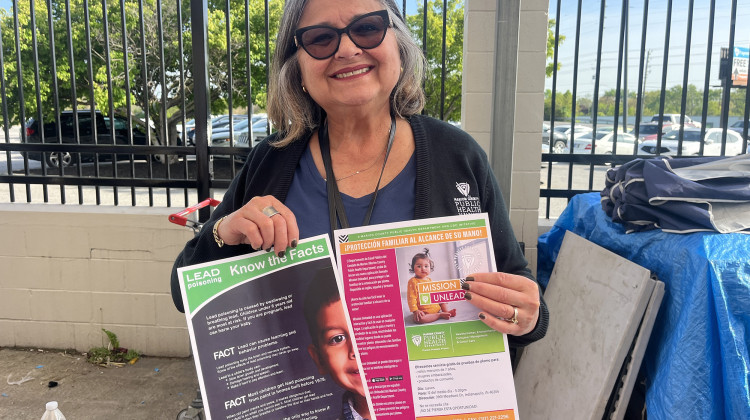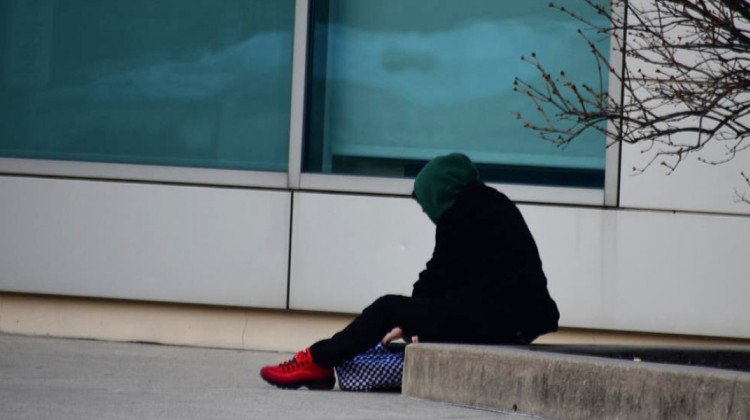
Maryori Duarte-Sheffield, a health educator for the Marion County Public Health Department holds up lead exposure resources at an immigration fair.
Violet Comber-Wilen / IPB NewsLead exposure can lead to long-term consequences for children, especially if not caught and treated quickly. Outreach on the risks of lead often falls to health departments, but what happens when there is a language barrier?
Maryori Duarte-Sheffield moved to the United States from Venezuela 24 years ago. She said, at the time, she didn’t know anything about lead and its risks. More than two decades later, she is helping other Spanish-speaking community members through the Marion County Public Health Department.
“I am the one that is going out and about, talking about lead poisoning prevention," Duarte-Sheffield said. "Getting to know the population, the Hispanic population, it's important.”
When Duarte-Sheffield thought of the value of her work, she reflected on a success story. She visited a home where children tested positive for lead, but the family couldn’t find the source. Duarte-Sheffield was able to recognize lead on one of the children’s necklaces.
“So we told them, remove it from the children," she said. "And problem solved. And those are things that fills my heart with joy. Because I know now that could happen. Even with jewelry.”
Her work took Duarte-Sheffield to a recent health resource fair for immigrants.
“Well, I’m here talking to people in person, letting them know about lead poisoning," she said.
Duarte-Sheffield said spaces like this one are important to get the word out about lead risks to Spanish-speaking communities. She feels like there is still not enough being done to share information and reduce barriers for lead testing.
Why do we need more lead education?
The need for more information and resources in Indiana keeps growing. Census data shows the Hispanic and Latino populations in the state grew by more than 40 percent in the last decade – to more than half a million people.
Gabriel Filippelli is the executive director of the Indiana University Environmental Resilience Institute. He said there are a lot of lead risks in the state.
“We’ve contaminated a lot of urban environments with a lot of lead," he said. "Just both from lead paint on homes, homes that have decayed, as well as lead from leaded gasoline that's been deposited in soils.“
There is no safe level of lead. Kids with lead poisoning may experience trouble learning, issues with behavior, and poor kidney function.

How can resources be shared more widely?
Michelle Del Rio is an assistant professor at Indiana University. She said to reach Spanish-speaking populations with information about the risks, health departments must consider how to best present it.
“From my experience, it works best when you are very transparent about what you want from the community to do and what the community or how the community is going to benefit from either your research or from preventing that exposure," she said. "And also having practical recommendations that are aligned with the resources that these families have.”
Del Rio works with a lot of mixed immigration status families. She said economic and immigration concerns can also be a barrier to lead testing.
“I think there's also maybe a fear that there's government involvement in it. If somehow participating and you're testing your home or testing your children," she said. "So maybe making sure that, the message is clear that this is not going to investigate your immigration status.”
Join the conversation and sign up for the Indiana Two-Way. Text "Indiana" to 765-275-1120. Your comments and questions in response to our weekly text help us find the answers you need on statewide issues.
Maryori Duarte-Sheffield said she is encouraged by education and outreach efforts so far – but more still needs to be done.
“More information to the parents, for the parents to request it in their children’s school. And also, you know, this is a dream if it would be a legislation about that. Something bigger. But it's just a dream," Duarte-Sheffield said. "How to make it happen? I have no idea.”
In the meantime, Duarte-Sheffield continues to work to engage Hispanic families through education, outreach and resources.
In Marion County, lead screening is available for children under 7, pregnant women and consumer products every Thursday from noon to 5 p.m. For more information, visit missionunleaded.org.
To find what resources are available in your county, contact your local health department.
Violet is our daily news reporter. Contact her at vcomberwilen@wfyi.org or follow her on Twitter at @ComberWilen.
 DONATE
DONATE






 Support WFYI. We can't do it without you.
Support WFYI. We can't do it without you.